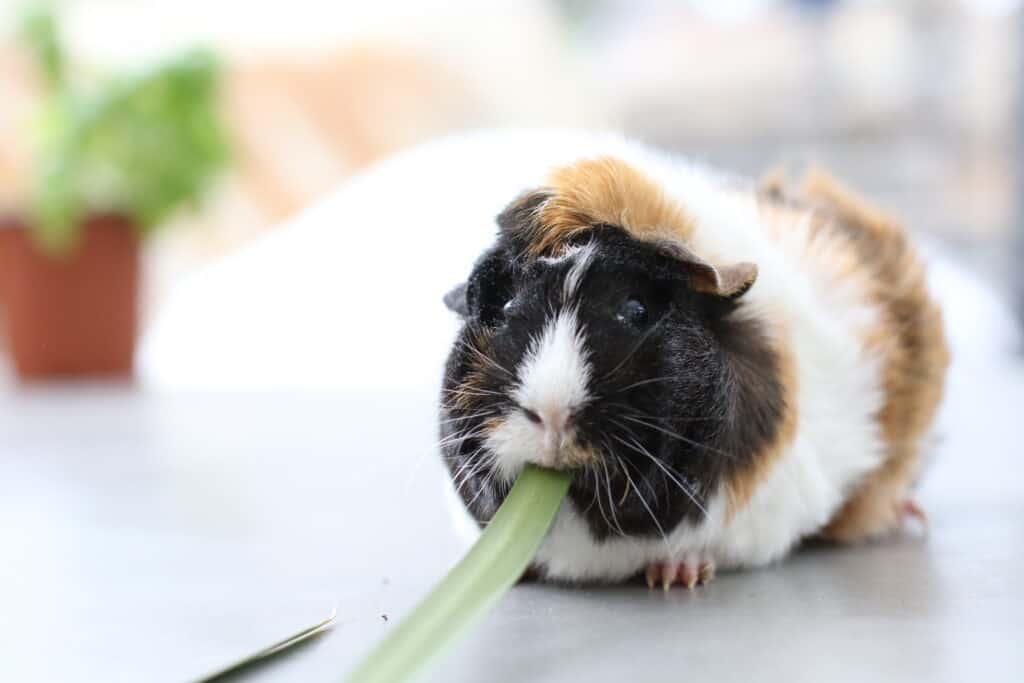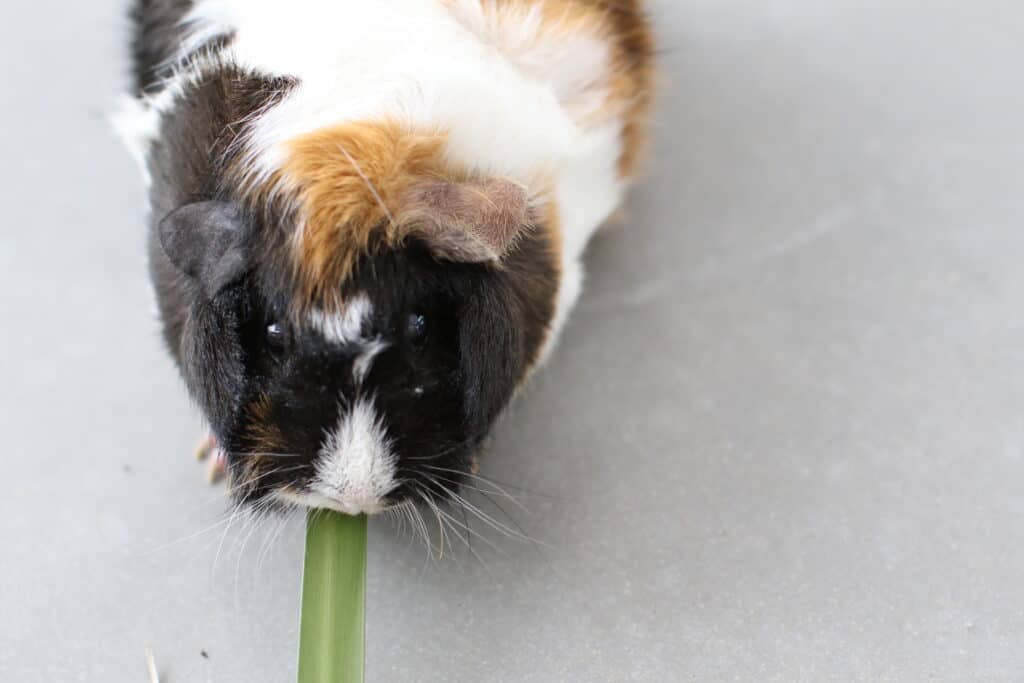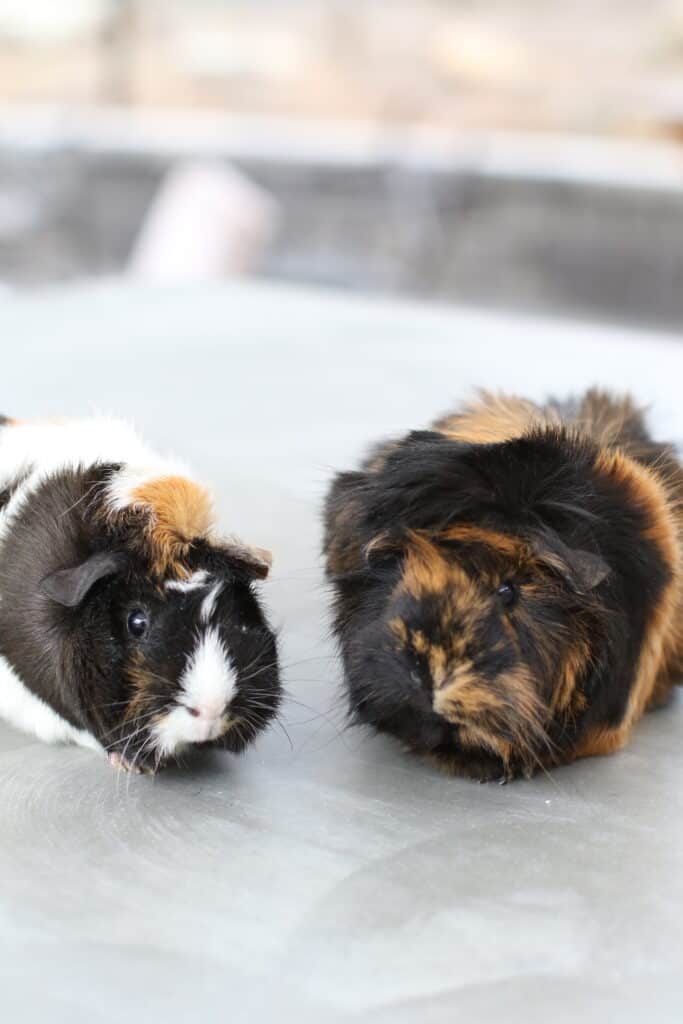As an Amazon Associate we earn from qualifying purchases.
Wheatgrass is a popular food choice for humans, but can guinea pigs eat wheatgrass? The answer is yes, guinea pigs may eat wheatgrass. Wheatgrass is an excellent source of fiber, which can help keep your guinea pig’s digestive system functioning properly.
It also contains vitamins A, C, and E, as well as minerals like zinc and selenium. All of these nutrients can help keep your guinea pig healthy and happy.
To learn more about the benefits of wheatgrass for guinea pigs as well as how to add it to their diet, keep reading further!
Is Wheatgrass Safe for Guinea Pigs to Eat?
Wheatgrass is a type of plant that is often used as a dietary supplement for humans.
Some people believe that wheatgrass can help improve the overall wellness of humans, while others believe that it can help cure various diseases.

Wheatgrass is also often used as a natural remedy for pets, such as dogs and cats. So, can guinea pigs eat wheatgrass?
Guinea pigs are small animals that are often kept as pets. They are known for their gentle and playful nature, and they can be a great addition to any family.
Like other animals, guinea pigs may also benefit from eating wheatgrass. Wheatgrass acts as a viable foundation for guinea pigs in terms of receiving nutrients such as including vitamins A, C, and E.
Wheatgrass can help improve the overall health of guinea pigs, plus it can even help cure some diseases.
If you are thinking about feeding wheatgrass to your guinea pigs, it is important to first consult with your veterinarian.
Some veterinarians may recommend that you do not give your guinea pig wheatgrass, while others may recommend a specific dosage.
It is also important to ensure that the wheatgrass is fresh & has not been sprayed with any chemicals.
Why Wheatgrass is Good for Guinea Pigs
Wheatgrass can offer a number of benefits to guinea pigs. The main benefit of wheatgrass is that it is an excellent source of nutrition for guinea pigs.
Let’s take a look at some other benefits of wheatgrass:
Excellent Source of Nutrition
Wheatgrass is an excellent source of nutrition for guinea pigs. The grass is packed with vitamins and other beneficial nutrients for your guinea pig. Wheatgrass can help boost the immune system, improve digestion, and increase energy levels.

Some vitamins and minerals found in wheatgrass include:
- Vitamin A: An antioxidant that can protect cells from damage
- Vitamin C: Helps fight off infection and helps the body to absorb iron
- Iron: helps carry oxygen around the body
- Calcium: Important for building strong bones and teeth
- Magnesium: Can help relax muscles and nerves
- Phosphorus: Supports energy production and cell growth
Can Help Improve The Overall Health of Guinea Pigs
Wheatgrass can help improve the overall health of guinea pigs. Additionally, it can be a benefit to their diet.
Wheatgrass is a rich source of nutrients and can help boost the immune system of guinea pigs, providing them with protection against infection and disease.
For these reasons, wheatgrass can be an important addition to guinea pigs’ diet and can help improve their overall health.
Helps Improve Digestion
The consumption of wheatgrass can help improve the digestion of guinea pigs.
Guinea pigs may suffer from a number of digestive problems, including constipation, diarrhea, and vomiting. Wheatgrass can help alleviate these problems and improve the overall wellness of the guinea pig.
Wheatgrass is packed with nutrients that are essential for guinea pigs’ digestion. It is a good fiber source, which can help regulate the digestive system.
Wheatgrass also contains chlorophyll, which can help detoxify the body and improve the absorption of nutrients.
Enhances Vitality
Wheatgrass is an effective way to enhance your guinea pigs’ health vitality.
Wheatgrass contains high nutrient levels, including essential vitamins and enzymes, which can help improve your guinea pig’s overall health.
Furthermore, wheatgrass can help detoxify your guinea pig’s system and even help fight cancer. Wheatgrass is a versatile food that can be fed to your guinea pig in a variety of ways, so give it a try today and see the difference it makes!
May Increase The Lifespan of Guinea Pigs
Wheatgrass can provide many benefits for guinea pigs, including increasing their lifespan. Wheatgrass is packed full of antioxidants and vitamins that can help keep guinea pigs healthy and functioning well.
The high antioxidant content found in wheatgrass can help protect guinea pigs from free radicals, damaging cells and leading to disease.
The nutrients present in wheatgrass can help keep guinea pigs’ immune systems functioning properly, as well as provide them with important nutrients they need to thrive.
Additionally, the chlorophyll found in wheatgrass can help detoxify the body and reduce inflammation. Overall, wheatgrass can be an important part of a guinea pig’s diet and help improve their health and extend their lifespan.
Is It Okay to Give My Guinea Pig Wheatgrass Every Day?
Yes, it is okay to give your guinea pig wheatgrass every day. However, you have to ensure that they are being fed in a moderate quantity.
You can feed wheatgrass to your guinea pigs every day since it can provide them with health benefits, such as increased fiber intake and improved digestion.

However, you should only give your guinea pig wheatgrass in small amounts; too much can cause digestive problems.
On average, try to give your guinea pig around 1-2 tablespoons of wheatgrass per day.
If you notice that your guinea pig is having trouble digesting the wheatgrass, reduce the amount you give them or stop giving it to them altogether.
Wheatgrass is considered to be a very beneficial add-on to your guinea pig’s healthy diet. At the same time, however, it is essential to be careful not to give them excessive wheatgrass.
Potential Side Effects of Feeding a Guinea Pig Wheat Grass
While wheatgrass is generally safe for guinea pigs, there are some potential side effects to be aware of.
Wheatgrass is a great source of nutrition for guinea pigs, but it can also sicken them if not eaten in moderation.
Some of the potential side effects of feeding a guinea pig wheatgrass include:
- Diarrhea: Wheatgrass can cause diarrhea in guinea pigs if eaten in large quantities. Limit your guinea pig’s intake of wheatgrass to ensure they don’t experience this side effect.
- Weight gain: Wheatgrass is high in calories. It can cause weight gain if eaten in excess. Make sure to monitor your guinea pig’s weight if you decide to feed them wheatgrass.
- Bloating: Wheatgrass can also lead to bloating in guinea pigs. Again, monitor your guinea pig’s stomach size if you decide to give them wheatgrass.
- Constipation: Wheatgrass can also result in constipation in guinea pigs. If your guinea pig has a difficult time passing stool after eating wheatgrass, stop giving it to them and consult with a veterinarian.
Overall, wheatgrass is a safe and healthy food for guinea pigs, but it should be eaten in moderation to avoid potential side effects. Monitor your guinea pig’s health carefully if you decide to give them this nutritious grass, and contact a veterinarian if any issues arise.